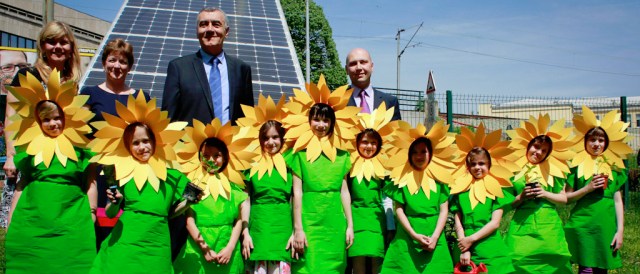For countries with widespread and established emigrant communities, crowdfunding can be a means to support sustainable development at home, reports Paul Hockenos.

UNDP model project in Croatia powers school with solar panels. (Photo by UNDP in Europe and Central Asia, CC BY-NC-SA 2.0)
I had the good fortune recently to cross paths with the UNDP energy team in Croatia, which is doing some creative, out-of-the-box thinking about bringing low-carbon development to the EU’s newest member. They believe they may have a new model for making renewable energy projects happen in communities that lack the capital to fund clean energy investments: namely crowdfunding. For those in the dark, crowdfunding is practice of funding a project by raising many small amounts of money from a large number of people, typically via the Internet. (See, for example, the website betterplace.org). This offers the public, including far-flung diaspora communities, the opportunity to participate in community development.
The UNDP unit, for example, had a primary school in the sun-baked Dalmatian town of Kaštel Lukšić along the Adriatic Sea. Its goal was to become the first energy-independent school in the whole of Southeastern Europe by covering its roofs with solar PV panels. Considering the year-round sunshine in this corner of the world, the locale was optimal. And the investment needed to make it happen wasn’t that great, but still the school was €8500 short, with the UNDP unable to cover all the costs either, despite matching contributions. The UNDP announced publicly in autumn 2013 that the campaign would be hosted on the Indiegogo crowdfunding platform.
According to one of the venture’s masterminds, UNDP project leader Mak Dujan, small amounts trickled until two donors with deeper pockets became aware of the campaign and pledged donations big enough to reach the funding goal. In total, 189 people made contributions via the crowdfunding platform. In the course of just months, the modest pilot project was a success.
Interestingly, the two main donors hail from Croatia’s European diaspora: one from Germany, one from Austria. The German donor, who stems from Kaštel Lukšić, held a fundraiser for the project, which is typical for crowdfunding campaigns. In Southeastern Europe, diaspora communities have long sent money to their families (and in times of conflict, to armies, parties, and politicos, too, sometimes exacerbating the bloodshed). Some poverty-stricken regions live from the euros and dollars sent regularly to them from Graz, Stuttgart, Toronto, and beyond. But it’s also the case that the sons and daughters from rural localities have an interest in the development of their home communities. The typical kinds of projects they gather money for are schools, roads, community centers, healthcare centers, and religious buildings, like churches and mosques.
Now renewable energy is also on that list and crowdfunding is a means to raise the money. Perhaps this small project on the westernmost edge of the Balkan peninsula is just a start.
Paul Hockenos is a Berlin-based journalist and author of the Going Renewable blog, where this post was first published.